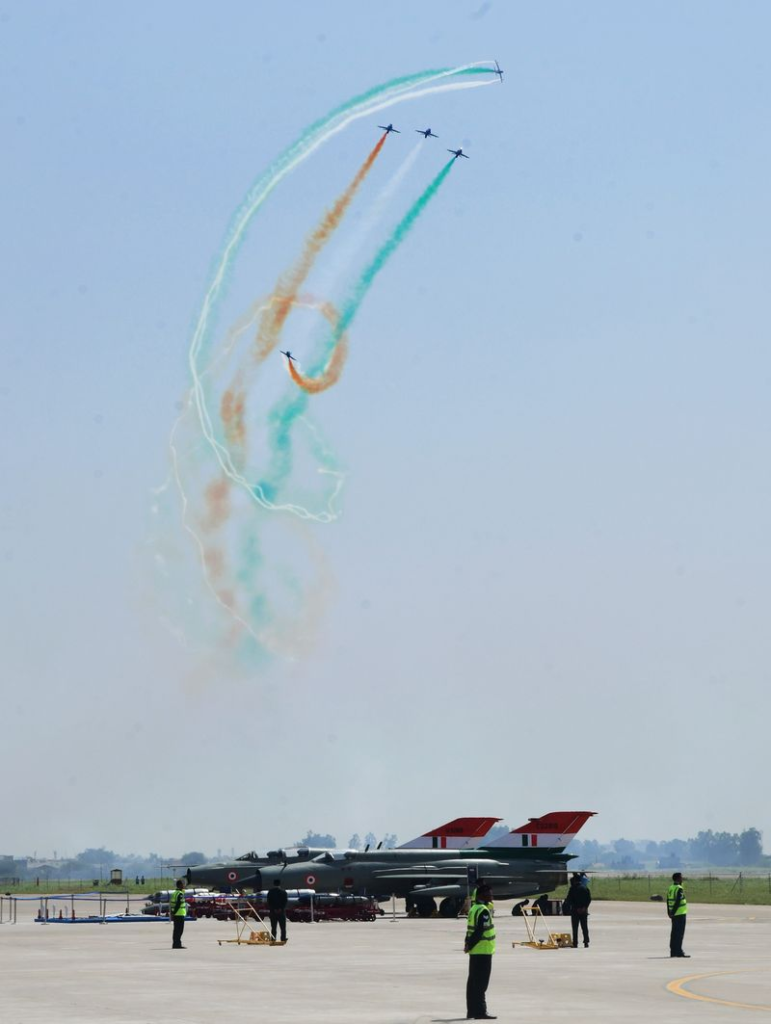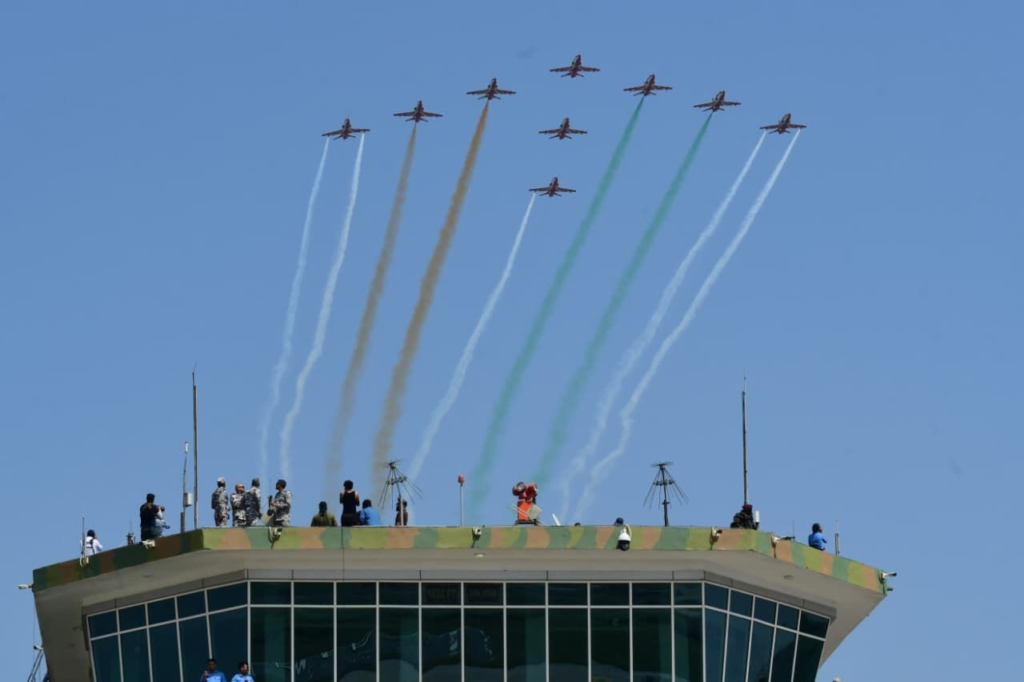Military Digest | The 1965 IAF war hero who deserved Param Vir Chakra
Flight Lieutenant Alfred Tyrone Cooke quit the Indian Air Force in 1968 and immigrated to Australia.
 Flight Lieutenant Alfred Tyrone
Flight Lieutenant Alfred Tyrone
As the country marks the 60th anniversary of the 1965 war, there is still time to correct some mistakes of the past when it comes to gallantry awards. One case in point is that of Flight Lieutenant Alfred Tyrone Cooke, who was awarded the Vir Chakra in an action against Pakistan Air Force (PAF) Sabre jets near Kalaikunda in West Bengal in September 1965.
Cooke’s gallantry in taking on four Pakistani Sabre jets, out of which he shot down one, damaged two and chased away a fourth (the last one without any ammunition) definitely entitles him to India’s highest gallantry award, Param Vir Chakra. For reasons unknown, Cooke was awarded the third-highest gallantry award.
The Vir Chakra citation
The citation for Vir Chakra of Flt Lt Cooke, as published in the Gazette of India in 1966, is reproduced here:
“On the 7th September, 1965 when Kalaikunda airfield was under attack by six Pakistani Sabre Jet aircraft Flight Lieutenant Alfred Tyrone Cooke who was leading two of our aircraft on combat air patrol immediately led the aircraft into intercept them. Although our own anti-aircraft guns had already started to fire, he had engaged two of the enemy aircraft in complete disregard of his personal safety. The enemy aircraft tried evasive and counter-offensive manoeuvres; but with firm determination and exceptional skill Flight Lieutenant Cooke outmanoeuvred the enemy and pressed home his attack and shot down one of the enemy aircraft which disintegrated in mid air. Subsequently, he skillfully put his aircraft in a favourable position behind another enemy aircraft, but by then he had no ammunition left. However, he kept the enemy on the run and the remaining enemy aircraft fled in confusion. In this action Flight Lieutenant Alfred Tyrone Cooke displayed great courage, leadership and devotion to duty in the best traditions of the Indian Air Force (IAF).”https://d-30130404841941845330.ampproject.net/2509031727000/frame.html
This issue has been highlighted in a previous edition of Military Digest, too, but the 60th anniversary of the war dictates that it must be highlighted again in the hope that someone in the IAF hierarchy will notice the glaring injustice done to Cooke.
Subsequent investigations by military historians and aviation experts, including former IAF pilots, have concluded that the Vir Chakra citation does not adequately address the valour shown by Cooke in those fateful minutes of combat. Incidentally, Flt Lt Cooke’s wingman, Flt Lt Subodh Mamgain, was also awarded the Vir Chakra in the same action.
A former Mirage pilot, Squadron Leader Sameer Joshi, has written an exhaustive account of Cooke’s air battle at Kalaikunda, and this matches the one which has been given by Cooke himself. A leading aviation historian of the country, Jagan Pillarisetti, has also written a detailed account of Cooke’s action in his book on the 1965 war co-authored with Sameer Chopra.
The air battle fought by Cooke
On the morning of September 7, 1965, the Pakistan Air Force (PAF) had launched a raid on the Kalaikunda air force base of India in West Bengal from its Tezgaon air base in East Pakistan. The early morning raid by six PAF F86 Sabre aircraft had been successful, and the PAF commanders thought to press home their advantage by mounting yet another raid at around 10.30 am to catch the IAF in a state of disarray.
This time, four PAF Sabres were pressed into attack, led by Flight Lieutenant Haleem. Interestingly, these raiders were from No. 14 Squadron of PAF, and the Hunter aircraft of Flt Lt Cooke and Flt Lt Mamgain that intercepted them were from No. 14 Squadron IAF. The IAF squadron was commanded by Wing Commander Dennis Anthony La Fontaine, who went on to become Chief of Air Staff.
Cooke and Mamgain, who were on a Combat Air Patrol (CAP), were vectored towards the intruding Pakistani aircraft. The duo arrived at Kalaikunda airfield to see that three PAF Sabres were strafing the ground positions while the fourth aircraft was orbiting high above, serving as a lookout.
In his detailed account of the air battle, Squadron Leader Sameer Joshi writes that Cooke asked Mamgain to interdict the orbiting Sabre while he dived to take on the three Sabres attacking the airfield.
In an intense chase, Cooke shot down a Sabre flown by Flying Officer Afzal Khan. He next took on the Sabre flown by Flt Lt Tariq Habeeb and shot it up so badly that Habeeb broke away from the fight and headed back to Tezgaon. Pakistani accounts confirm that his aircraft was useless for the rest of the war due to the damage.
With two PAF aircraft out of the fight, Cooke now engaged in air combat with a third Sabre flown by Flt Lt Haleem and shot off pieces of his aircraft, leading Haleem to quit the fight and head back to his base.
By now, Cooke had also suffered hits on his aircraft, was exhausted and had run out of ammunition. However, he still had fight left in him, and now he took on the fourth PAF Sabre, which engaged in a chase with Mamgain. With no ammunition, Cooke chased the Sabre through every twist and turn and may even have rammed into it, but the enemy pilot broke loose and flew to safety, perhaps perplexed as to why he had not been shot.
It is undeniable that Flt Lt Cooke had exhibited valour of the highest quality in taking on the four Pakistani aircraft and saving Kalaikunda air base from certain destruction. However, it is not clear why he was awarded a Vir Chakra when he clearly deserved the highest gallantry award, Param Vir Chakra.
Alfred Tyrone Cooke quit the IAF in 1968 in the rank of Flight Lieutenant and immigrated to Australia, where he now lives. He visited his old squadron, No. 14, in Ambala in 2015 to mark the 50th anniversary of the 1965 war and gifted his Vir Chakra to the Squadron.
It is time that the IAF revisits this gallant action over Kalaikunda in 1965 and decorates Flt Lt Cooke with the Param Vir Chakra that he deserves.
A US perspective on medal upgradation
In May 2021, US President Joe Biden awarded the US’s highest gallantry award, Medal of Honour, to Col Ralph Puckett Jr, 93, for acts of valour during the Korean War in November 1950. It was an upgrade from the Distinguished Service Cross, the second-highest gallantry award in combat in the US, which Colonel Puckett was initially awarded.
In September 2023, Capt Larry Taylor, 81, was awarded the Medal of Honour by President Biden for an act of valour in the Vietnam War in June 1968. This, too, was an upgrade. He had earlier been awarded the Silver Star, the third-highest gallantry award in combat in the US.
ALSO READ | Military Digest | Fallen but not forgotten, the Commanding Officers who died in battle in 1965
In both the above instances, the original gallantry award had been upgraded to the highest gallantry award decades after the actual action took place in combat. This was done after a campaign to upgrade the award was undertaken by friends and military historians.
The same must be done by the IAF for Flight Lieutenant Alfred Tyrone Cooke.


 Flight Lieutenant Alfred Tyrone
Flight Lieutenant Alfred Tyrone 
































































